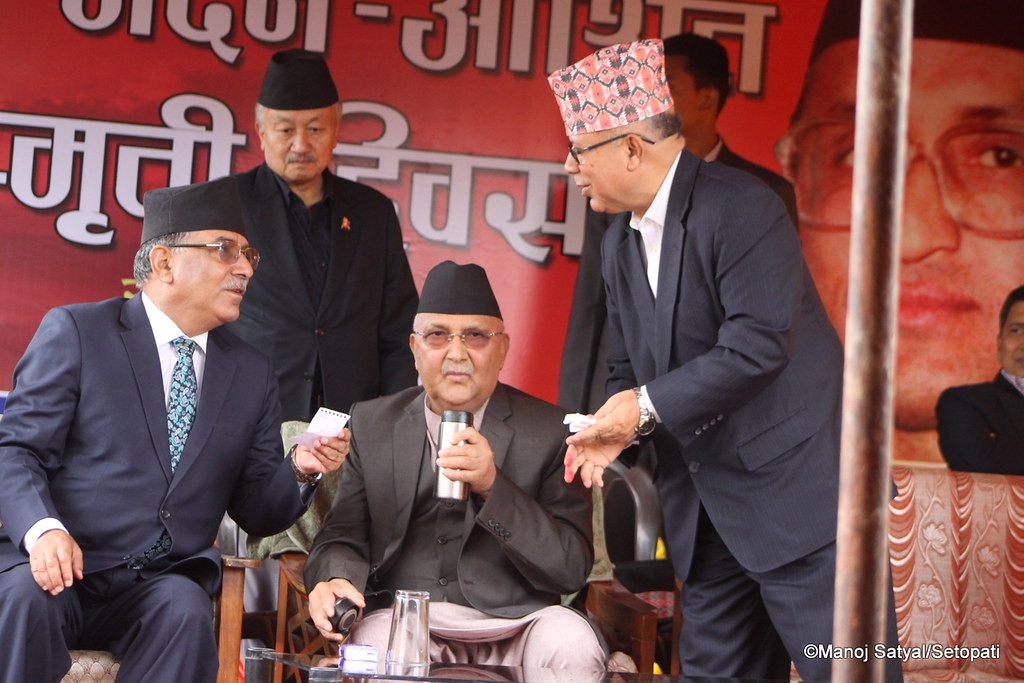The recent revelation that CPN Chairmen Pushpa Kamal Dahal and KP Sharma Oli had agreed to take turn to become prime minister (PM) has created ripples in Nepali politics.
Dahal had accepted that there was such agreement about taking turn as PM even in an interview with Indian journalist Jyoti Malhotra in September 2018 during his India visit. But that did not become a big issue.
The recent revelation in an interview with journalist Rishi Dhamala, however, has gained significance as Dahal not only revealed that PM Oli had agreed to make way for him after two and a half years but also warned that Oli will be finished if he dishonors the agreement.
CPN leaders, coming from the then CPN-UML, however feel that Dahal has his eyes set on becoming the sole chairman of the party than becoming the PM.
A standing committee member close to Oli opines that Dahal is already getting the benefits of government. "The ministers coming from the then CPN (Maoist Center) already brief him regularly. He has already visited India, America and China as the ruling party chairman, and gets respect almost on par with the PM when he visits different areas of the country," the leader states.
Dahal had raised the issue of general convention while addressing the program organized in the third week of April to commemorate the establishment of the first communist party in Nepal. He had said the district conventions should be held within eight months and the general convention within a year.
No CPN leader apart from Dahal has spoken about the general convention.
Dahal, it seems, wants the early general convention to establish him as the sole chairman of the largest party in exchange for allowing Oli to continue as the PM even after the agreed term of two and a half years.
But the give-and-take that Dahal so craves for does not look as straightforward as CPN currently also has a third faction headed by senior leader Madhav Kumar Nepal in a way that alliance between any two of the factions would nullify the third faction.
Dahal, in fact, is the strongest among the three leaders due to the dynamics of unification. The 45-strong standing committee has 19 former Maoists while the allegiance of the rest is divided almost equally between Oli and Nepal.
Similarly, Dahal has three votes in the nine-strong secretariat including Ram Bahadur Thapa and Narayan Kaji Shrestha while Dahal can also count on Bam Dev Gautam who has already proposed that Dahal be made the sole chairman.
Oli has three including Bishnu Paudel and Ishwore Pokharel, and senior leaders Nepal and Jhala Nath Khanal complete the secretariat.
Any faction getting a majority of five in the secretariat will control the party. Oli already got a wind of that when Dahal, Nepal, Khanal, Gautam and Shrestha held a secret meeting in Jhamsikhel when Oli was in Davos for the annual meeting of World Economic Forum in January.
Oli has tried to get cozy with Thapa after that and Dahal has reportedly become suspicious after Thapa as coordinator of the task force for organizational unification put too many leaders close to him, for Dahal's comfort, in the list for politburo members to fill the quota for former Maoists.
Dahal seems to calculate that Oli would be reluctant to leave Baluwatar--and he may well have hinted that during the recent open meeting Dahal talked about with Dhamala--and may agree to make him the sole chairman after the general convention for unification.
Nepal, on the other hand, seems to be determined that the party leadership should not go to a former Maoist. He would rather have the Maoist at Baluwatar than heading the party from Dhumbarahi. The majority of cadres coming from the erstwhile UML also seem to have that position.
And Oli, any way, would have to make the sacrifice for that scenario.
Nepal, therefore, may support Dahal for the post of PM if it were to come down to the choice between the PM or chairman for Dahal. But Oli would not be quitting Baluwatar so easily.
The triangular power distribution in the party would make the equation interesting. An alliance between Oli and Nepal, both coming from the then UML, denying Dahal both the post of PM and chairman can make Dahal feel cornered and even threaten long-term unification.
Oli would, therefore, rather ally with Dahal and hand him the party leadership, while Nepal almost definitely would ally with Dahal and make him PM.
Dahal would believe he stands to gain either way.

